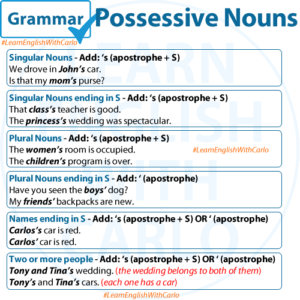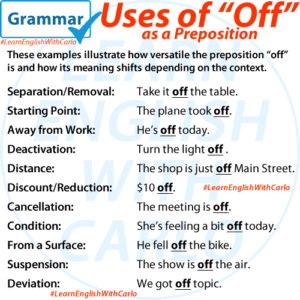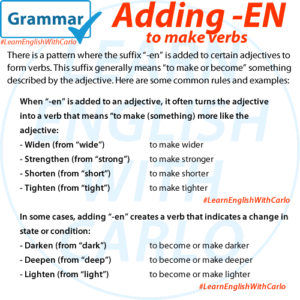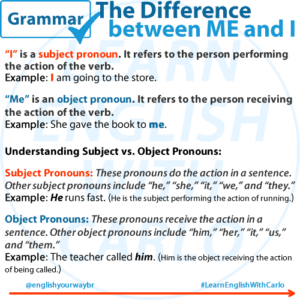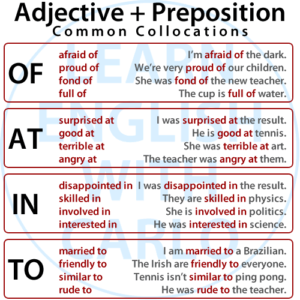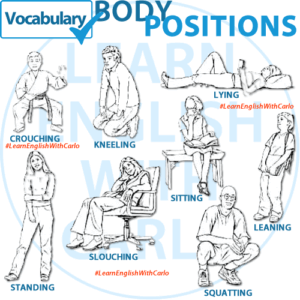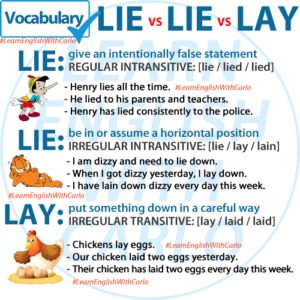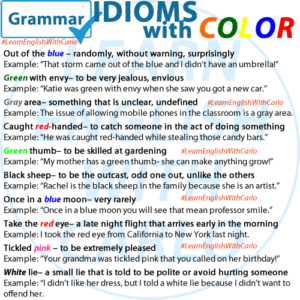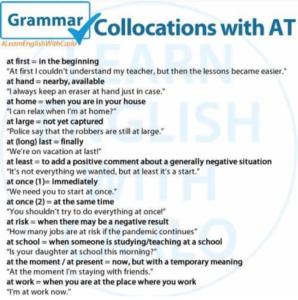Author's posts
Possessive nouns can seem tricky at first, but once you grasp the rules, you’ll find them easy to use. In this post, we’ll explore how to form possessive nouns in different contexts, ensuring that you can confidently show ownership in your writing. 1. Singular Nouns For most singular nouns, showing possession is straightforward. Simply add …
Continue reading
Permanent link to this article: https://englishyourway.com.br/mastering-possessive-nouns-in-english/
The preposition “off” has many different uses in English, depending on the context. Here’s a breakdown of its main uses: 1. Separation or Removal 2. Starting Point (in Time or Space) 3. Away from Work or Duty 4. Deactivation or Disconnection 5. Distance or Separation 6. Reduced or Discounted 7. Cancellation or Suspension 8. Condition …
Continue reading
Permanent link to this article: https://englishyourway.com.br/uses-of-off-preposition/
Turn Adjectives & Nouns into Verbs! Did you know you can add -EN to some adjectives and nouns to create verbs? This is a powerful and useful suffix in English. It often means “to make” or “to become” something. In this post, we’ll look at how this suffix works and give you plenty of examples …
Continue reading
Permanent link to this article: https://englishyourway.com.br/verb-suffix-en/
English learners often get confused between “its” and “it’s” — and even native speakers make mistakes with these two! But don’t worry. Once you understand the difference, it’s easy to get it right every time. 🔤 Quick Explanation 🔎 When to Use “It’s” It’s is a contraction (short form) of: 📌 Examples with “it is”: …
Continue reading
Permanent link to this article: https://englishyourway.com.br/its-vs-its/
One of the most common mistakes English learners (and even native speakers!) make is using “I” and “me” incorrectly. While they both refer to the same person — the speaker — they are used in different parts of a sentence. In this post, we’ll explain the difference and give you lots of examples so you …
Continue reading
Permanent link to this article: https://englishyourway.com.br/i-vs-me/
Adjectives are words used to describe a person, place, or thing, for example, The tall man in the red shirt is a friend of mine. We drove along a quiet road until reaching a small town. I’m reading an interesting book. Prepositions are words used to connect two ideas or to demonstrate the relationship between …
Continue reading
Permanent link to this article: https://englishyourway.com.br/grammar-adjective-preposition-2/
We place our bodies in different positions depending on what we are doing. Do you know the names of the different positions? One of my INSTAGRAM followers asked to use each one in a sentence, so here you go: Can you think of any other positions? If you have any questions or doubts, please ask …
Continue reading
Permanent link to this article: https://englishyourway.com.br/body-positions-vocabulary/
English can be tricky, especially when it comes to words that sound the same but have different meanings and uses. A common source of confusion is the difference between “lie,” “lie,” and “lay.” These three words are often mixed up, but understanding their meanings and how they are used can help you use them correctly. …
Continue reading
Permanent link to this article: https://englishyourway.com.br/lie-vs-lie-vs-lay-understanding-the-differences/
Out of the blue – randomly, without warning, surprisinglyExample: “That storm came out of the blue and I didn’t have an umbrella!” Green with envy– to be very jealous, enviousExample: “Katie was green with envy when she saw you got a new car for your birthday.” Gray area – something that is unclear, undefinedExample: The …
Continue reading
Permanent link to this article: https://englishyourway.com.br/grammar-idioms-with-color/
The preposition “at” is used in many common expressions in English, each with unique meanings. Below, you’ll find clear explanations and examples to help you understand and use these expressions confidently. Let’s explore! 1. At First = In the beginning This expression describes the initial phase of something, often followed by a change. Examples: 2. …
Continue reading
Permanent link to this article: https://englishyourway.com.br/grammar-collocations-with-at/
Load more

